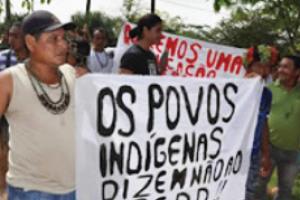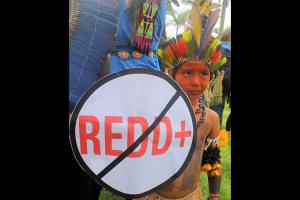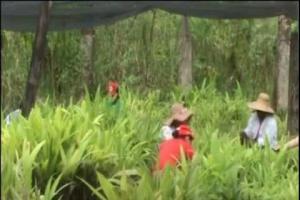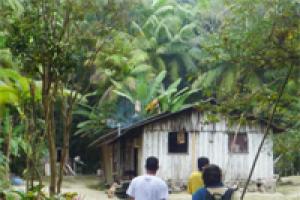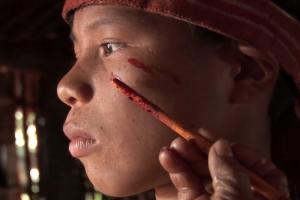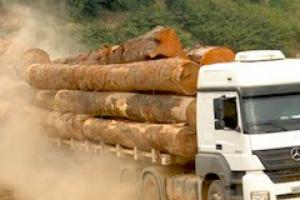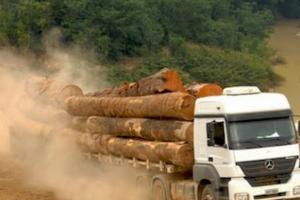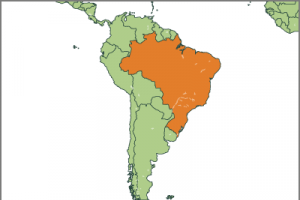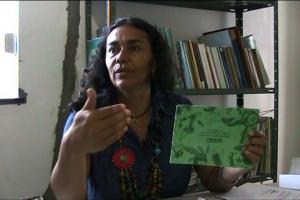The Pindaré Caru indigenous movement, composed of the Guajajara and Awá people, blocked the VALE multinational mining railway this past Oct. 3 in the town of Alto Alegre do Pindaré, State of Maranhão.
The blockade was mounted in protest to the loosening of Brazilian legislation on indigenous rights (measures such as PEC 215 and Resolution 303/2012 by the State Attorney General). The aim of this loosening is to make it easier for multinational companies like VALE to appropriate indigenous territories and thus benefit even further from the exploitation of these riches.
Brazil
Other information
14 December 2012
By Sindicato dos Trabalhadores Rurais de Xapuri – Federação do Povo Huni Kui do Acre.
What are the real problems of forest peoples in Acre?
Why aren’t REDD and environmental services a solution to these problems?
What concerns forest peoples about REDD and environmental services?
Download the full document here
Bulletin articles
14 December 2012
A story of the peoples of the Atlantic Forest in southern Brazil in a disputed territory where the green economy competes with community-based economies.
Multimedia
11 December 2012
Produced by the World Rainforest Movement
Interviews: Winnie Overbeek
Camera and Edition: Flavio Pazos.
A story of the peoples of the Atlantic Forest in southern Brazil.
In Brazil, the Atlantic Forest, which covered the country's entire coastline 500 years ago, is seriously endangered.
Other information
25 November 2012
by Winfridus Overbeek
Bulletin articles
30 October 2012
The Brazilian organizations Juízes para a Democracia (Judges for Democracy) and CIMI have launched a petition addressed to various Brazilian authorities to demand the urgent demarcation of indigenous lands in the country, particularly in view of the disastrous situation faced by the Guaraní-Kaiowá people in the state of Mato Grosso do Sul. The Guaraní-Kaiowá who live in the PyleitoKue/Mbarakay territory announced that they would rather die en masse than leave their territory in reponse to an eviction order and threats.
Other information
30 October 2012
Over the last two decades, the Latin America and Caribbean region has lost 9% of its forest cover, primarily as a result of logging, the expansion of agribusiness, major infrastructure projects like highways, hydroelectric dams, mining, oil drilling and urbanization, as well as forest fires and the conversion of forests to other land uses, largely caused by these same activities.
Other information
25 October 2012
By Elder Andrade de Paula
On the eve of another world conference on the environment – Rio+20 – which places emphasis on the climate crisis, we are witnessing major efforts by the centres of world power to promote a discussion with no real discussions. The worn-out model of “sustainable development”, now recycled under the new name of “green economy”, is being put forward as the only alternative to “save the planet”.
Other information
23 October 2012
“Sustainable on Paper”, a documentary film by journalists An-Katrien Lecluyse and Leopold Broers released in Belgium in 2011, is now available on the internet. The film broadly denounces the FSC certification of plantations owned by one of the biggest eucalyptus and pulp companies in Brazil, Veracel Celulosa, a joint venture of Brazilian-based Fibria and Swedish-Finnish transnational Stora Enso.
Other information
30 September 2012
The traditional communities known as geraizeiras at the Vale do Guará Settlement, in the town of Rio Pardo de Minas, north of Minas Gerais, denounce that an airplane spraying poison on a major eucalyptus plantation has hit the community, intoxicating 30 people, including children, elderly, youth and adults. They felt nausea, fever, vomit and itching skin. Airplane spraying is increasingly common in Brazil – the world's champion in pesticide use.
Bulletin articles
30 September 2012
The area planted with oil palm trees in Brazil used to be relatively small as compared to other countries producing this plant in Latin America. However, big transnational companies in Brazil like Vale and Petrobrás have revealed the rapid expansion of these plantations meant for the production of biofuels, in the Amazon region, mainly in the State of Pará.

